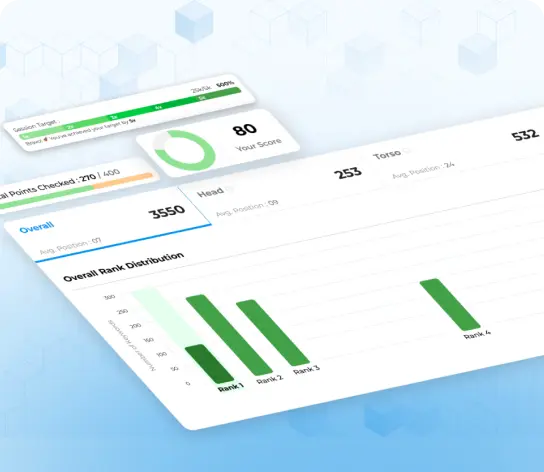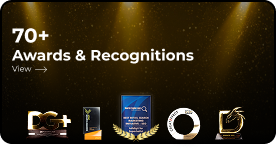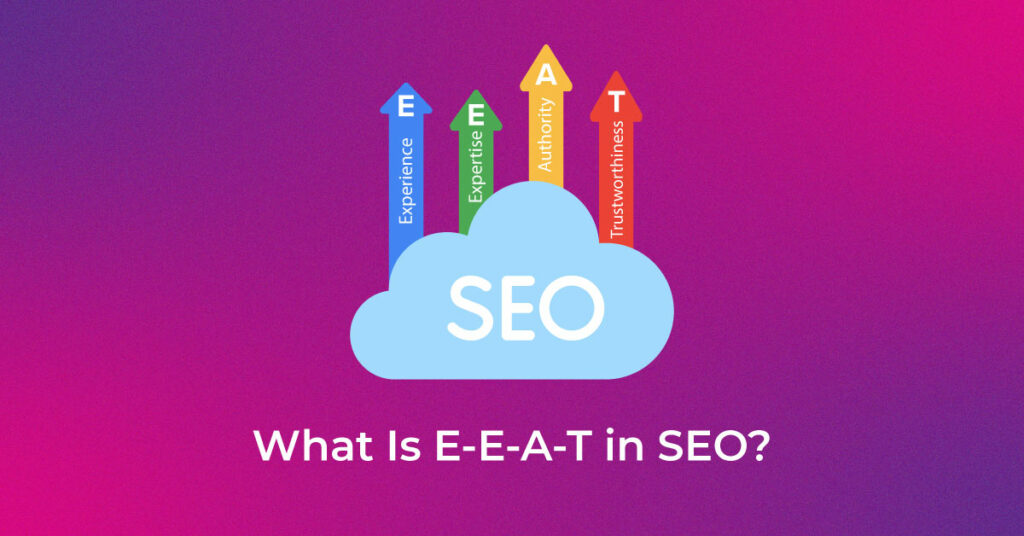Let’s Connect & Accelerate Your Organic Growth
- Your data is properly secured encrypted by SSL
With so much content published online every day, standing out in search results takes more than just keywords. Google is constantly refining how it evaluates content to ensure users get accurate, reliable, and helpful information. That’s where EEAT in SEO comes into play.
If you’ve ever wondered what EEAT in SEO is, it refers to a set of quality principles – Experience, Expertise, Authoritativeness, and Trustworthiness—that help search engines determine how credible your content is. Strengthening your EEAT can significantly impact how your website ranks and how users perceive your brand. Let’s dive deeper into this concept and explore how you can improve your website’s EEAT in SEO.
What Does E-E-A-T Stand For?
E-E-A-T stands for Experience, Expertise, Authoritativeness, and Trustworthiness. It’s a concept from Google’s Search Quality Evaluator Guidelines that helps assess the credibility and quality of content. Strong E-E-A-T signals can improve your website’s chances of ranking higher in search results. We’ll break down each element below to help you understand how they impact your SEO strategy.
Experience
In E-E-A-T, Experience refers to the firsthand involvement a content creator has with the topic they’re covering. This could include using a product, visiting a location, or going through a specific situation. Google favors content written by people who have experienced what they’re talking about, as it adds depth, authenticity, and real-world value.
Experience can also relate to how users interact with your website. A site that’s easy to navigate, visually clean, and well-structured improves the overall user experience, making visitors more likely to stay and engage.
Example:
A healthcare blog written by someone who has managed a specific condition personally is more impactful. On the other hand, a cluttered website with poor navigation may cause users to leave quickly, hurting both trust and search rankings.
Expertise
Expertise in E-E-A-T refers to the depth of knowledge and qualifications a content creator brings to a specific topic or industry. This is especially critical for YMYL (Your Money or Your Life) content, such as health, legal, or financial advice, where accuracy directly impacts readers’ lives. Google favors content that demonstrates formal education, hands-on experience, or industry-recognized expertise.
Example:
A website focused on intellectual property law should feature content written by professionals with a law degree and real-world experience in the field. Offering detailed insights on patents, copyrights, and trademarks, such content builds trust and satisfies Google’s expectations for expertise.
Authoritativeness
Authoritativeness is the recognition a website or content creator receives within their industry or niche. It’s determined by factors like a strong backlink profile, references from other credible sources, consistent content quality, and user trust over time. Google also looks at user engagement metrics, such as time on site and bounce rates, to assess authority.
High-quality backlinks from respected websites, mentions by industry leaders, and a long-standing web presence all contribute to a site’s authority.
Example:
A digital marketing blog referenced by top SEO publications or cited by well-known experts in the field demonstrates strong authoritativeness and is more likely to rank higher in search results.
Trustworthiness
Trustworthiness measures how reliable, transparent, and secure a website is for users. Google evaluates whether users can feel confident in the content, the site’s purpose, and its data protection practices. Key indicators include HTTPS security, clear contact details, transparent authorship, citations, and adherence to privacy and ethical standards.
Example:
A financial advice website that discloses its sources of funding, explains how content is created, and uses secure browsing protocols builds trust. When such a site also provides accurate, regularly updated content aligned with industry standards, it earns both user confidence and Google’s trust.
E-E-A-T vs. E-A-T: What’s the Difference?
E-A-T stands for Expertise, Authoritativeness, and Trustworthiness—three key factors Google uses to evaluate content quality. In late 2022, Google added an extra “E” for Experience, turning it into E-E-A-T. This addition highlights the value of firsthand knowledge or personal involvement with the subject matter.
The difference lies in this added focus: while E-A-T emphasizes what you know and how trusted you are, E-E-A-T also considers how closely you’ve interacted with the topic. Together, they help search engines deliver more reliable and helpful content to users.
What is YMYL and How is it Related to E-E-A-T?
YMYL stands for Your Money or Your Life—a term used by Google to describe content that can impact a person’s health, finances, safety, or overall well-being. Because of its potential consequences, Google holds YMYL content to a much higher standard.
This is where E-E-A-T becomes essential. To rank well, YMYL content must clearly demonstrate Experience, Expertise, Authoritativeness, and Trustworthiness. Whether it’s medical advice, legal guidance, or financial tips, Google expects this content to come from credible sources with real knowledge and integrity to protect users from harm.
Timeline: How E-E-A-T Evolved in Google’s Guidelines
Google’s approach to content quality has evolved over the years to better serve users with accurate and trustworthy information. Here’s a quick timeline of how E-E-A-T came to be:
- 2014 – Google introduced E-A-T (Expertise, Authoritativeness, Trustworthiness) in its Search Quality Evaluator Guidelines to help assess content quality, especially for YMYL (Your Money or Your Life) pages.
- 2018 – E-A-T gained more attention with Google’s Medic Update, impacting sites offering health, finance, and legal advice.
- 2022 – Google added a new “E” for Experience, evolving E-A-T into E-E-A-T. This addition emphasized the importance of firsthand knowledge and real-world involvement with the topic.
This timeline highlights Google’s ongoing efforts to prioritize helpful, credible, and user-centered content across search results.
People Also Read: Keyword Density
How is E-E-A-T used by Google?
Google uses E-E-A-T in SEO to assess the quality and credibility of website content. Google’s algorithms and quality raters use this as a framework for evaluating the content, particularly in industries where accuracy and reliability are paramount. Google assesses expertise by evaluating the author’s credentials, experience, and reputation within the industry. Authoritativeness is assessed by evaluating the website’s reputation, quality of content, and the authority of external sources that cite the website or its content. Trustworthiness is assessed by evaluating the accuracy and reliability of the information provided and the transparency and credibility of the website and its authors.
Is Google E-E-A-T a ranking factor?
Though E-E-A-T is not a direct ranking factor, it is a vital consideration for SEO because it affects the quality and credibility of content, which are factors that can ultimately impact search engine rankings. Google’s E-E-A-T guidelines are particularly important for websites in several industries, such as health and finance, where the accuracy and reliability of information are critical.
For example, if a medical domain website publishes content with necessary keywords but incorrect information, the site will receive a slew of negative reviews and have a higher bounce rate. Further, the content will remain published without obtaining any links. A site with credible and accurate content, on the other hand, will rank higher in search results due to its reputation among potential users.
Unlock higher rankings, quality traffic, and increased conversions through tailored award-winning SEO strategies. Elevate your web presence
by Infidigit’s SEO solutions. Unlock higher rankings, quality traffic, and increased conversions through tailored award-winning SEO strategies.![]()
![]()
Is E-E-A-T really important for your business?
Yes! E-E-A-T is incredibly important for businesses that rely on their website to generate leads and revenue. E-E-A-T is a vital factor that Google uses to assess the quality and credibility of websites and content, and it can significantly impact search engine rankings.
For example, a medical practice that publishes accurate and informative content on its website demonstrates its expertise and authority in the field. It is more likely to rank higher in search results than a medical practice with poorly written or inaccurate content.
To prioritize E-E-A-T in online content, you should focus on providing accurate and up-to-date information, citing credible sources, and establishing your expertise and authority in your respective industry. You can achieve this through thought leadership content, industry partnerships and collaborations, and positive customer reviews and testimonials.
However, it is critical to note that building E-E-A-T is a long-term process that requires ongoing investment and attention. You can also benefit from partnering with an SEO agency, like Infidigit, that can help identify the scope for improvement and develop a comprehensive strategy.
Tips On How to Improve E-E-A-T in SEO
Increasing expertise
Increasing expertise is a key step in improving E-E-A-T in SEO. It shows Google that your website is a reliable, knowledgeable source in your niche. One effective way to build expertise is by consistently publishing high-quality, valuable content such as in-depth guides, case studies, and white papers that educate and inform your audience.
Highlighting your qualifications, industry experience, and unique insights also reinforces your authority. Additionally, building connections with other experts and influencers in your field can strengthen your credibility and lead to quality backlinks—both of which help boost your rankings and online reputation.
Discuss your own experiences.
Discussing your experience demonstrates that as a content creator, you have direct experience and practical knowledge in the field. By sharing your own experiences, you can also establish a personal connection with the reader and increase the credibility and trustworthiness of the content. Additionally, discussing your experience can make the content more relatable and helpful to readers by providing practical tips and advice based on real-world situations.
For example, if you are a salaried employee working remotely, a blog post on the best practices for remote work could discuss your experience working remotely. You can provide specific examples of successfully managing your work schedule, communication with colleagues, and productivity.
Provide examples
Providing examples in content demonstrates that the content creator has a deep understanding of the topic and can put practical, real-world examples to illustrate their points. By providing concrete examples, the content also becomes more engaging and helpful to readers, which can increase the time they spend on the page and reduce bounce rates, both of which are positive signals for SEO.
For example, an article on a specific software program’s benefits could provide various industry successful implementation use cases and examples to illustrate its effectiveness. This demonstrates that the writer has experience and expertise in the field and is not just regurgitating general information.
Use references
Provide additional sources of information and evidence that the content relies on trustworthy sources. This can establish the content’s credibility and increase its value to users. For example, a blog post on the benefits of meditation could reference scientific studies or quotes from recognized experts in the field, which would provide additional support for the claims made in the post.
Additionally, linking to relevant external sources can improve the content’s usefulness and relevance to users. This can increase users’ time on the page and reduce bounce rates, contributing to better SEO rankings.
Use technical vocabulary and keywords
Using technical vocabulary and keywords naturally and appropriately without overloading your content with irrelevant or unnecessary terms is crucial.
Let’s say you operate a website that provides information on diabetes management. Incorporating technical vocabulary such as “hemoglobin A1C” or “glucose monitoring devices” can demonstrate your expertise and authority within the healthcare industry. Using relevant keywords such as “diabetes management tips” or “insulin administration techniques” can improve your website’s visibility in search engine results pages and attract audiences searching for information on diabetes management.
Improving authoritativeness
Link building
Link building is critical for building site authority and improving search engine rankings. By obtaining high-quality backlinks from other reputable websites, you can demonstrate to search engines that your website is a reliable and credible source of information.
One effective strategy for building site authority through link building is to focus on obtaining backlinks from authoritative and relevant websites within your niche. This can involve connecting with other websites and requesting that they link back to your site while creating high-quality content likely to attract backlinks naturally.
Internal linking is another way to improve site authority. By linking to other relevant pages and content within your website, you can boost user experience.
Making use of social media platforms
Maintain an active social media presence to demonstrate your expertise in a particular field or industry. Share insightful content and engage with your audience to establish yourself as a thought leader.
Second, social media establishes your authority on a specific subject. For example, if your company is in the finance industry, try to keep your audience informed on federal government policies, such as what they are doing to control inflation, how it will affect general public finances, and so on. Sharing informative content boosts the probability that others will link back to your content, signaling to Google your dominance.
How to improve your trustworthiness?
Make sure your web domain is secure
The most crucial factor in securing a website is HTTPS encryption. Using HTTPS helps encrypt data exchanged between your website and your users, which can help to protect sensitive information from being intercepted by third parties.
HTTPS is also a vital factor in Google’s algorithm. Websites that use HTTPS are generally given a higher ranking in search results. In addition to HTTPS, there are other technical measures that you may consider to improve your website’s security and trustworthiness. These include implementing two-factor authentication, regularly updating your software, and using strong passwords.
Request reviews from clients
Reviews can serve as a form of user-generated content that you can display on your website, giving potential customers an idea of what they can expect when working with your business.
In addition to providing social proof, reviews can positively impact your website’s search engine rankings. Google’s algorithm considers the quality and quantity of reviews for a business, with businesses that have a higher number of positive reviews generally being given a higher ranking in search results.
You can increase the number of reviews by implementing strategies such as sending follow-up emails after a sale, displaying review prompts on your website, and providing incentives for customers who leave feedback.
Coping with negative feedback
Coping with negative feedback can be challenging but vital for maintaining your website’s trustworthiness. Negative feedback can impact your business’s reputation and hurt your search engine rankings.
One way to cope with negative feedback is to respond to it in a timely and professional manner. It demonstrates to other potential customers that you take their concerns seriously and are committed to providing quality customer service. Additionally, responding to negative feedback can also provide an opportunity to address any issues previously raised, potentially leading to a positive resolution and improved customer satisfaction.
Another effective strategy for coping with negative feedback is to proactively solicit and use it to identify areas for improvement.
Provide NAP details
NAP information is a critical component of local SEO, as it helps search engines identify your business location and contact details. Ensuring that your NAP details are accurate and consistent across your website and other online platforms can help establish your business’s credibility and legitimacy. Inaccurate or inconsistent NAP information can lead to confusion among potential customers while negatively impacting your search engine rankings.
One effective strategy for providing NAP details is to include them prominently on your website’s homepage and contact page. This makes it easier for potential customers to find your contact information and improve your website’s visibility in local search results.
Can AI Help You Optimize for E-E-A-T?
Can AI Show Experience?
AI can simulate human experience by drawing from vast datasets, user behavior, and existing content to produce context-rich material. While it doesn’t personally experience topics, it can help reflect real-life scenarios or user journeys if guided with accurate prompts, data, or firsthand input from human experts. To truly demonstrate experience, combine AI-generated content with personal anecdotes, reviews, or user case studies.
Can AI Demonstrate Expertise?
Yes—AI can help organize and present expert-level content based on trusted sources, industry research, and technical knowledge. However, it should be used as a content assistant rather than the sole creator. The best approach is to have AI draft content that is later reviewed, edited, and approved by qualified professionals to ensure accuracy and credibility, especially for YMYL (Your Money or Your Life) topics.
Can AI Build Trustworthiness?
AI can support trust-building by maintaining content consistency, avoiding factual errors (when paired with human oversight), and ensuring your site follows SEO and formatting best practices. It can help structure privacy policies, FAQs, and compliance pages—but transparency and authenticity still require a human touch. Publishing author bios, citing sources, and being clear about content ownership remain essential for trust.
Google’s View on AI-Generated Content
Google doesn’t penalize AI-generated content simply for being machine-created. Instead, it evaluates content based on E-E-A-T principles and overall helpfulness. If AI-generated content is accurate, valuable, and aligns with user intent, it can rank well. However, content created purely for search rankings, without real value, may still be flagged as low quality. Google encourages transparency and recommends clearly stating when and how AI is used in your content strategy.
How to Measure the Impact of E-E-A-T on Your Website
Measuring the impact of E-E-A-T on your website helps you understand if your SEO and content improvements are paying off. While E-E-A-T itself isn’t a direct ranking factor, its influence shows through key performance indicators. Here’s what to track:
- Organic traffic growth – A steady increase suggests your content is resonating with users and search engines.
- Keyword rankings – Improved positions for target keywords indicate stronger perceived relevance and authority.
- Bounce rate and time on site – Lower bounce rates and longer sessions hint at better user experience and trustworthy content.
- Quality backlinks – More links from credible websites signal growing authority.
- Customer reviews and online mentions – Positive feedback adds to your trustworthiness and reputation.
Regularly reviewing these metrics helps you fine-tune your E-E-A-T strategy for long-term SEO success.
FAQs About E-E-A-T
What are Google’s E-E-A-T standards?
Google’s E-E-A-T standards stand for Experience, Expertise, Authoritativeness, and Trustworthiness. These are quality signals used in its Search Quality Evaluator Guidelines to assess whether content is helpful, credible, and created by knowledgeable sources—especially on topics that impact users’ lives.
Is E-E-A-T a direct ranking factor?
No, E-E-A-T is not a direct ranking factor like page speed or keywords. However, it’s a set of signals Google uses to evaluate content quality and credibility. Strong E-E-A-T can significantly influence how well your content performs in search results.
Does E-E-A-T affect YMYL pages more?
Yes. Your Money or Your Life (YMYL) pages are held to higher E-E-A-T standards. Since these pages affect people’s health, finances, or safety, Google places more weight on trustworthy, expert-created, and accurate content when ranking them.
How can I show real experience on my website for E-E-A-T?
You can show real experience by sharing first-hand insights, case studies, real-world examples, testimonials, or stories that reflect genuine interaction with the subject. Content written from personal or professional experience signals authenticity to users and search engines.
How can I improve my website’s expertise for E-E-A-T?
To improve expertise, create in-depth, well-researched content written by knowledgeable contributors. Include credentials, author bios, and cite reputable sources. Content in niches like health or law should be created or reviewed by certified professionals.
How can I build authoritativeness in E-E-A-T?
Build authority by earning backlinks from reputable sites, publishing content consistently, and getting featured or cited by other experts in your industry. Positive press, awards, and guest posts on trusted platforms also support authoritativeness.
How can I improve my website’s trustworthiness for E-E-A-T?
To improve trustworthiness, be transparent about who you are—include clear contact info, privacy policies, secure HTTPS, and accurate content. Encourage client reviews and display trust signals like certifications, security badges, and real testimonials.
Conclusion: Delivering Real Value with E-E-A-T
In today’s digital age, the Internet is a primary source of information. Hence, creating content that does not provide accurate information and doesn’t demonstrate the necessary expertise, authoritativeness, and trustworthiness is detrimental to your success.
By implementing the E-E-A-T principles, websites can increase their visibility, credibility, and user engagement, leading to better user experiences and higher search engine rankings. Ultimately, E-E-A-T is not just a buzzword; it is a holistic approach to SEO that aligns with Google’s mission of providing the most relevant and trustworthy information to its users.
Popular Searches
How useful was this post?
4.2 / 5. 17











